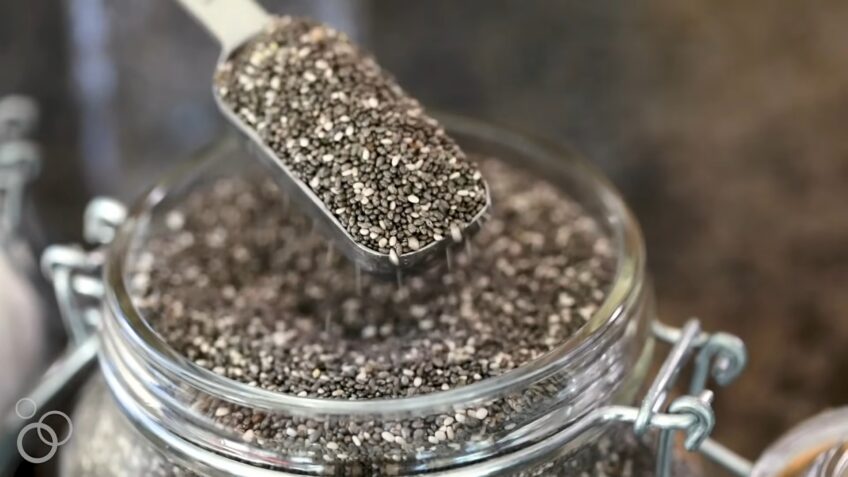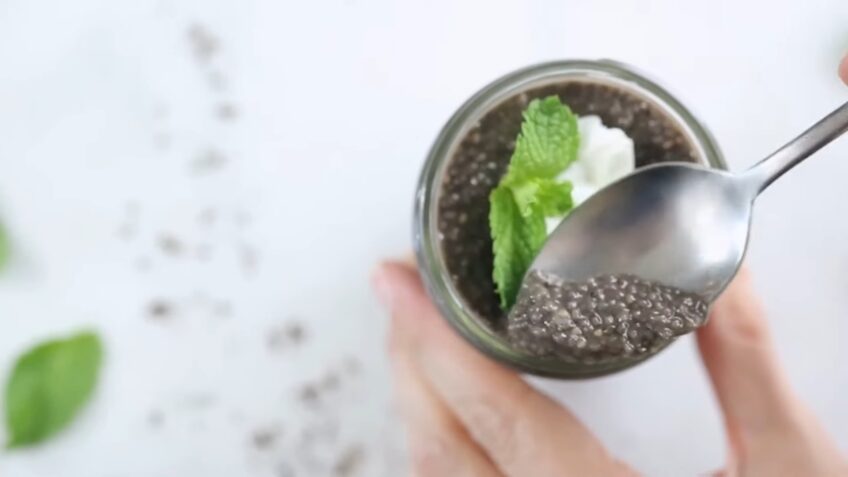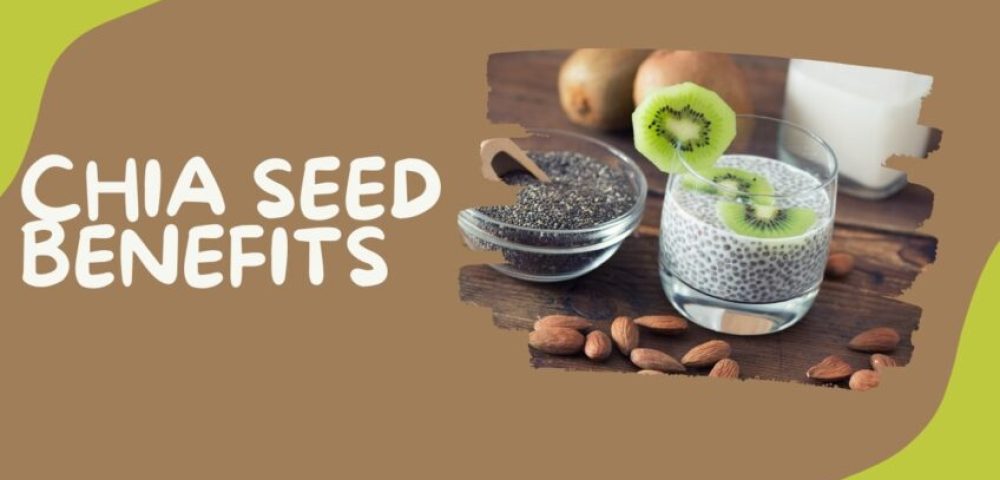In our world that’s increasingly tuning into healthy eating, these little power-packed gems have been stealing the show. And let me tell you, there’s a good reason they’ve been pushed into the health food spotlight!
With a nutritional profile that’s off the charts and their easy adaptability in just about any dish, chia seeds are truly a force to be reckoned with. So, why all this chatter about these teeny, tiny seeds, you ask? I’m here to share the secret.
Page Contents
The Basics
What Are Chia Seeds?

Chia seeds are tiny black seeds from the plant Salvia hispanica, native to Central America. These seeds were a staple in the diets of ancient Mayans and Aztecs and were prized for their ability to provide sustainable energy. Today, they are recognized as a modern-day superfood that’s packed with essential nutrients and antioxidants.
These may be small, but their health benefits are anything but. They are loaded with essential nutrients like omega-3 fatty acids, fiber, protein, and various minerals. Plus, they are incredibly versatile and easy to incorporate into a wide range of recipes – from smoothies and oatmeal to baking goods and salads.
Why Are They So Popular?
The popularity of chia seeds in the health and wellness world is relatively recent, having gained significant attention in the past decade. This rise in popularity can be attributed to increased health awareness, the trend toward natural foods, and a greater understanding of the powerful health benefits that these seeds provide.
Not only are they incredibly nutritious, but they are also gluten-free and can be eaten raw, making them a great food choice for many people. The seeds also have a mild, nutty flavor that can complement a wide range of dishes, making them easy to incorporate into your daily diet.
Nutrient Profile

| Nutrient | Amount per serving |
|---|---|
| Calories | 137 |
| Protein | 4.4 grams |
| Fat | 8.6 grams |
| Omega-3 fatty acids | 4915 mg |
| Omega-6 fatty acids | 1620 mg |
| Fiber | 10.6 grams |
| Carbohydrates | 12.3 grams |
| Calcium | 177 mg |
| Magnesium | 95 mg |
| Phosphorus | 265 mg |
| Zinc | 1.0 mg |
| Potassium | 44.8 mg |
| Copper | 0.1 mg |
| Manganese | 0.6 mg |
Chia seeds are a nutrient-dense food, meaning they pack a large amount of essential nutrients into a small serving. Just two tablespoons of these seeds provide a good portion of the daily recommended amounts of fiber, protein, and omega-3 fatty acids.
They are also rich in several minerals like calcium, phosphorus, and manganese. Moreover, they are an excellent source of antioxidants. These compounds help fight off harmful free radicals in the body, reducing inflammation and protecting your cells from oxidative damage.
The high antioxidant content not only adds to the nutrient profile of these seeds but also enhances their shelf life, allowing them to stay fresh for longer.
Quality Protein and Fiber Source

A unique feature of these seeds is their high-quality protein content, which is particularly unusual for plant-based foods. Protein is an essential nutrient necessary for many bodily functions, including muscle repair and growth, hormone production, and immune function.
This makes them a great protein source for vegetarians and vegans. Chia seeds also shine in their fiber content. In fact, almost all the carbohydrates in them are fiber. This fiber feeds the friendly bacteria in your gut, promoting gut health.
Additionally, fiber helps you feel fuller for longer, reducing hunger and aiding in weight loss.
Why are they so good?

They Support Heart Health
Due to their high fiber and omega-3 content, chia seeds are heart-healthy food. High-fiber diets have been linked to a lower risk of heart disease, largely by reducing levels of LDL (bad) cholesterol, total cholesterol, and triglycerides.
Omega-3 fatty acids, on the other hand, have anti-inflammatory effects and can help lower blood pressure and reduce heart disease risk. Moreover, they contain a good amount of protein, which has been associated with reduced heart disease risk.
The antioxidants present in these seeds also contribute to heart health by reducing inflammation and preventing plaque buildup in the arteries.
They improve Digestive Health
Given their high fiber content, it’s not surprising that chia seeds can improve digestive health. Fiber adds bulk to your stool, which can help prevent constipation and promote regular bowel movements. This, in turn, promotes overall gut health. In addition to promoting bowel regularity, the fiber in these seeds can also aid in weight management.
Dietary fiber absorbs large amounts of water and expands in the stomach, increasing fullness and slowing the absorption of food. This helps you feel fuller for longer and can help prevent overeating.
How to Incorporate Chia Seeds into Your Diet?
These seeds are incredibly easy to incorporate into your diet, thanks to their versatility. They have a mild, nutty flavor that works well in a variety of dishes. You can add them raw to your smoothies, yogurt, or oatmeal, or use them as a topping for salads and cereals.
One of the most popular ways to consume them is in the form of chia pudding, a dish made by soaking the seeds in milk (or a milk alternative) until they expand and develop a gel-like consistency. This pudding is not only a hit among adults but is also a nutritious treat for babies and children. You can also use them in baking as a replacement for eggs, making them a great option for those following a vegan diet.
Precautions and Possible Side Effects
While chia seeds are generally safe for most people and offer numerous health benefits, they can cause issues for some people if eaten in excess. Given their high fiber content, consuming too many of these may cause digestive issues, such as bloating or abdominal discomfort.
It’s also worth noting that chia seeds can absorb up to 27 times their weight in water, so they should always be eaten after they’ve been soaked or mixed with other foods. Eating dry seeds and then drinking water can cause the seeds to swell in the esophagus, leading to a blockage.
FAQs:
Can chia seeds improve my athletic performance?
Some athletes consume these for their potential to boost energy and endurance, though more research is needed to substantiate these claims.
Are they safe for everyone to consume?
While chia seeds are generally safe for most people, those with a seed or nut allergy should also consult their doctor before consuming them.
Can I eat them raw?
Yes, you can. However, they can also be soaked, cooked, or ground,
How much chia seeds should I eat in a day?
Two tablespoons (about 28 grams) per day is a common recommendation.
How long can I store them?
When stored in an airtight container in a cool, dry place, these chia seeds can stay fresh for up to two years.
Final thoughts
The benefits of chia seeds are clear – they’re a nutrient-dense superfood that can support heart and digestive health, among other benefits. Their versatility makes them easy to incorporate into your diet, whether in smoothies, oatmeal, or baking.
With a bit of creativity, you can use chia seeds in a variety of ways in your daily meals. Incorporating these seeds into your diet is a simple and delicious way to enhance your nutritional intake. With their rich nutrient profile and multiple health benefits, it’s no wonder that these tiny seeds have made such a big splash in the health and wellness community.
As with any food, it’s important to consume them in moderation as part of a balanced diet. While they are power-packed and beneficial, remember that variety is key to a healthy diet. So, go ahead and discover the endless possibilities with these seeds today!
Dr. Sophia Harrison, an authoritative voice in the field of medicine, is not only the founder of the illustrious Fischer Institute but also its main content curator, bringing a treasure trove of knowledge and expertise to her readers daily.















